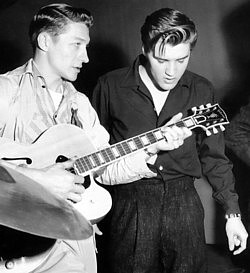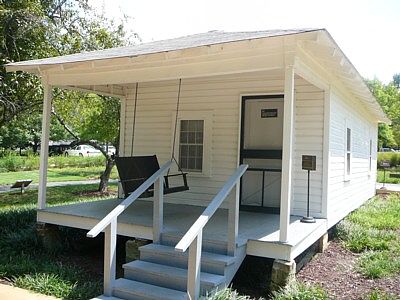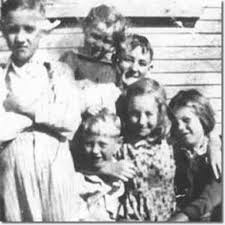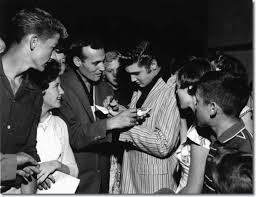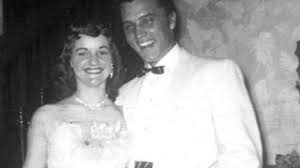 |
 |

Author, businessman and ETA............Dennis Forbus Contacting Dennis: INTERVIEWIntroduction: Dennis Forbus is known to many American Elvis fans as D. Wayne or "Alabama Elvis," the stage name he has been using for years as he performs as a full time Professional Elvis Impersonator. Dennis is a man of many titles, responsibilities, and goals including . In the professional world, he is a singer, actor, songwriter, Impersonator, recording artist, and published author to thirteen works, dating over the past 27 years. The first volume in Dennis'(book) trilogy on Elvis was recently published, and is in EIN's opinion, one of the stand-out Elvis books of 2014! Including many rare photos and based on research over two decades and interviews with many of Elvis' family and those who knew and worked with him Elvis: An American Trilogy Volume 1 "Family" is understandably winning rave reviews from fans and those from Elvis' inner circle. In a wide ranging and intriguing interview with EIN, Dennis talks about:
EIN: Who is Dennis Forbus? DF: Wow, It is Saturday, at 5:20am, what a question to wake up to! Well today I’m in a hotel, not for business, but to share the day with my family, and a birthday party for my grandson, Mason. I would say, Dennis Forbus is no one special without the grace and mercy of my Lord Jesus Christ and the help He gives me to get through each day. I am a Christian (In Service For The King), a Husband (to Karen), a Father (to Nathan, Nikki, Christian & Cody), a Gran-D (To Raegan, Nate, & Mason, a Minister (34 yrs Counseling and working with the Under Dogs), a Writer (13 projects), a Recording Artist (Gospel & Elvis), a Singer & Songwriter, and a Professional Elvis Impersonator. And I guess after spending the greater part of 19 years gathering Elvis information for my books, many would say that qualifies me to be an Elvis Historian. I also love to write poems and cards for all occasions. I was born in a small town in Anniston, Alabama, but now live in the northern Georgia Mountains in Blairsville. I earned a BA Degree in Psychology, Christian Counseling, and Criminal Justice from Liberty University. A business owner for over 14 years, and a full time traveling entertainer, doing Elvis & Others Shows, and book signings worldwide. I enjoy riding horses, singing & listening to Elvis and Gospel music, performing shows, and sitting on the porch of my cabin in the mountains, just me and my dog, drinking coffee, writing, and watching deer play in the yard. EIN: How did you get the idea for doing a trilogy of books around Elvis? DF: When I was 11 years old, May 1, 1975, I was blessed with the opportunity to see Elvis Live in Concert at the Omni in Atlanta, Georgia. That night really changed my life completely. As Elvis came out on that stage, there was enough camera lights flashing to light up New York City! The thrill of hearing those drums, then the screaming of the crowd, and the Charisma that Elvis brought to the stage. His looks, moves, and his voice was the very first Trilogy I remembered about him. God used Elvis in so many ways, but that night I looked up at my Mother and told her; “Mom, one day I want to do what he’s doing!” I went back to school, signed up for the choir, and knowing that God gave me the gifts and talent, but he used Elvis to give me the desire and to push me out of my shell. Because of him I’ve been singing Gospel music since 1983, and doing Elvis shows since 2008. With that being said, I wanted to tell the world of the influence Elvis held on not only my life, but he changed many during his life time, and many more since his death. This Trilogy set is an honor and privilege to write and share with the world a man that I feel God used greatly in fulfilling his purpose in life. EIN: How would you describe Elvis: An American Trilogy Volume 1 “Family” Mississippi to Memphis to fans? DF: Personally, I don’t like to read very much because I had to do so much while in college. However, I wanted to write this book differently than any other Elvis book I had ever seen or read. I wanted to keep it simple, yet true; exciting but not overboard, and full of photos that stayed true to the stories and gave the readers a visual tour of the daily life and adventures of Elvis’ childhood in Tupelo, all the way to the gates of Graceland. I think we’ve done that by writing this book in first person. It is a great history coverage of the Presley and Smith families, and gives a clear picture into the childhood town of Tupelo that Elvis grew up in. Without understand the childhood of Elvis, one could never understand Elvis at all!
Dennis Forbus with George Klein EIN: Basing the narrative in the first person is an unusual approach. What was the genesis to doing that? DF: Nigel, I must tell you this book has taken us four years to complete. The original title was “Elvis, From Graceland to Gloryland.” But once we started doing all the investigative work, going onto locations, traveling miles, and meeting people after people with true Elvis stories, we knew then that one book would never contain our information. We also wanted to give to the fans, all the cool stuff we had learned over these 19 years. When trying to get started for the seventh time in writing this Volume One, I just asked myself the question; “What would Elvis be doing as a child and facing all the things that these people, his family, friends, and classmates had told me about?” I begin to answer my question, as if Elvis was sitting there with me and telling me what to say. I had wrote about a page of these answers, when it came to mind; Let’s write this book and allow Elvis to tell all these stories in his words, using the information from over 73 people, but turn it around to be Elvis telling us the stories, not these people. So we decided to do First Person and to my knowledge, all the folks we have heard from, have told us they really have enjoyed the book and felt like they were watching a movie of Elvis while reading our book. So if any of you want to make a movie about our book, it does make a good screenplay, and we would love to get a movie deal on this book. EIN: Your use of first person narrative also closely reflects the nuances of ‘southern speak’ (for want of a better term). Was that easy for you to achieve? DF: Yes Nigel, I’m a southern boy too! I didn’t talk as country as most, but I am from the deep South and grew up in many of the same ways and teachings as Elvis did. Going to church, singing gospel music, family time, not having many things, being shy, not popular; I would say, this was one of the easy parts and at times, the funny parts of writing. It even took me back to some of my own childhood stories, especially when he got into trouble. EIN: Something that impressed me in reading Volume 1 is how well you have connected the first person narrative to the events in Elvis’ life, for example, Elvis realizing why girls were screaming when he sang (moved his hips/legs). This cannot have been an easy thing to achieve. Please tell us about the process you went through to make it work. DF: Well much of this comes from the gifts that God has given me to understand others and to feel the hurts, pains and joys that they have. In psychology, we learn a lot about the brain, how it acts and reacts. In counseling, you learn how to place yourself in the situation that the person you are dealing with is actually facing at that very moment. Not everyone can do that. This is not really taught by the teachers, schools, or even the textbooks; but it is a gift from God, that He has given to me to understand people better. My parents have both died and went to Heaven years ago. My children continued saying on special occasions, “I sure do wish Granddaddy and Grandmammie was here so I could talk to them, or so they could share in this event!” Well I started doing something that I called, “Letters From Heaven.” Each time my children would come to a major life event, then would always get a letter from Heaven, (which was me writing a letter on their behalf, placing myself in their mindset, trying to think on the words they would be saying to my children looking down from Heaven). And in Volume One, you’ll see some of that done with Elvis writing a very intimate chapter to his daughter Lisa Marie. Marian Cocke read our book and told me, “I felt Elvis’ presents all through it.” Now about the moving of his parts: Knowing how Elvis was raised, his dreams, and his shyness, he was in a world so different than he had ever known before. He was getting told to do so much, and so many things, from so many different people. I personally think his head was spinning so fast in his first few years that his body got so twisted he couldn’t do anything else but shake! I think in my mind, while I was writing, the little boy in a man’s body was scared to death! I was told by family members, band members, and even girlfriends, that he would be so nervous backstage, that he would already be shaking. When he went out on stage at the Overton Shell, they told me he wasn’t shaking on purpose, he just couldn’t help it! Dixie Locke (Elvis’ Girlfriend at the time) said, “When Elvis went out there on the stage to sing, he started with his voice, then as he moved around and his legs were shaking, the girls begin screaming and went crazy over it! When Elvis came off the stage, I told him to keep shaking like that and the girls would keep on screaming!” So I took what I was told and placed myself in the mind set of Elvis; and also understand that I too am a professional Elvis Impersonator, and the ladies scream when I perform, and Elvis was so much nicer looking than I am!
Louisiana Hayride..... .....the weekly radio program for future music superstars in the southern states of the USA in the 1950s EIN: How many interviews did you conduct in writing the book and who were some of the most interesting people you talked to? DF: Over the past 19 years, I’ve interviewed over 73 people, and that total keeps growing every week. We have already scheduled to interview six – eight more people that have read our first book now and have called us wanting to be a part of this project. Some have refused because they didn’t know who we were, but maybe that will change soon. I use to travel singing gospel music. Years ago, I was able to meet and interview JD Sumner, Donnie Sumner, Jake Hess, James Blackwood, and others, and that was an interesting time. Also, while at a small church in Colt, Arkansas, the Pastor took me to a house in the nearby town of Wynn, to meet some people. He didn’t tell me where we were going, or who I was going to meet, but he knew I was a big Elvis fan. It was in the early 90’s I believe it was either October or November of 92 or 93, the house was that of Elvis’ Aunt Nash and Uncle Earl. I had never seen a picture of them before, and still didn’t know who I was meeting that day until I walked into another room and there stood Uncle Vester Presley, and I had seen pictures of him before and knew who he was. Aunt Nash was sick and in the bed, but we still spoke with her a little bit, Karen and Donna their daughters were there too. Uncle Vester had rode over to check on Nash his sister. It was a great time meeting and talking with them about Elvis, what type of man he was, his faith, and how they felt about working for him as family, and what kind of changes they seen in Elvis the man verses Elvis the Icon? You’ll have to read their answers in our next volumes. George Klein sat down and gave us a great interview at the Horseshoe Casino. Marian Cocke was and is one of our favorite people in the Elvis world. She invited my daughter and I to her home in Memphis, and gave us a great interview. Larry Geller has offered us so much information about Elvis, and even the do’s and don’ts about our book project. Dr. Nick, Sam Thompson, Cynthia Pepper, and now you just got me in trouble, because all of these folks were great people to meet and to interview and to share their Elvis stories with us. And we can’t forget the Tupelo friends, family members, teachers, pastor, and historians that helped us in this first volume. Mackey Hargett offered us family photos and stories as a cousin to Vernon and Elvis. Julian Riley, a Mississippi Historian, helped with more photos and stories of the early Tupelo. Patsy Presley and Sybil Presley, and many friends and classmates, spent hours with us sharing their stories and photographs. And at the last minute; Alfred Wertheimer called us and gave us permission to use whatever photographs we needed in our projects, and he too is one interview you’ll want to read in our Volume Two coming out in the Spring of 2015. EIN: What were your greatest discoveries in preparing Volume 1? DF: The biggest discovery was the influence that Elvis Presley had and still has in the world in which we live. It was always a known fact, but I never really discovered exactly how much until after I had started this project years ago. Knowing that his gift and purpose in life was bringing people together, and here in 2014, 37 years after his death, he is still making a difference in the lives of others. Elvis has the largest fan clubs in the world, still out sales others in music, movies, and his home is visited more than any other private home in the world. In his name, charities are still raising money. Think about it; when you say Elvis, everyone knows who you are talking about, no matter what country, and even without including his last name. Another thing is how many Rock Artists, could sing gospel music right in the middle of their concert and never lose the crowd, but instead, gains respect and given more attention and awards for doing so? The REAL Love and the TRUE feeling of Loss is still present today when you speak about Elvis to others. Those that worked for him, with him, or were just friends, fans, family members, or even strangers, all shares one common thread; “ Elvis was a very caring and giving man, and he will continue being missed by many.” Another thing it made me realize was that it rebirthed the American Dream in my life. He was a poor boy from Tupelo, considered poor white trash to most! But if you find the purpose that God has for your life, God has a way of molding you into the person you were meant to be. Elvis allow God to use him in a way few other will ever know or understand. My mission is to help explain that in this Trilogy set.
Dennis with author Sandi Pichon (Raised on Elvis! Elvis! Elvis!....published 2004) EIN: As the volume covering Elvis’ early years up to late 1955-early 1956 you examine Elvis’ background........his roots. Please tell us how you went about this and what were some of your major findings. DF: Many years of information has been cited, found, photographed, and filed into my mind, ears, and heart. Julian Riley spent many days and hours with us over the past few years in developing this first book. We rode miles down the streets of Tupelo, met many people and held hours of interviews. Went on locations of properties that were at one time the home places of Elvis and his family. We spoke to childhood friends and family members, collected family photos and stories, searched library and historical records, all in the name of Integrity! We have tried very hard to keep everything simple, to the point, honest and true. Just because someone told us a story, doesn’t mean we printed it! We spent lots of time tracking down the truth and verifying what was told to us. And even though we did that, I’m sure we too have made some mistakes, overlooked some things, or crossed up a story or photo along the way. We know that we are not perfect, but simply ask that if you find something that doesn’t seem right, just let us know and we will promise to look into it and change what needs to be changed in the future. Some of our finding will be kept for a while longer. We must not tell everything we know upfront. EIN: “The Wild Bunch Gang” – tell us about that......was Elvis cruising for a bruising ? DF: Elvis was not the “Big Ass Bad Boy” that Hollywood and everyone tried to make him out to be, nor was he a bad trouble-maker as a child. He was very quiet, polite, and well mannered. He was raised the old fashioned way; not like today, he was raised to respect his parents and other adults, the law, and to help others along the way. He had a fear for God, respect for the church, and obedience for his Momma. He was not perfect, but was overall a good boy. He and some friends did get into trouble for stealing some copper wire from a company and tried to sell it at the scrap yard, but even then, they ended up taking it back to where they stole it from. Read about the Wild Bunch, stealing some Wild Chickens! Yes he was an all American boy, wondering around town, but he respected his Momma enough not to get into lots of trouble. I honestly think he felt like he wasn’t much of a child at all. With his Daddy being put into prison, he felt responsible enough to help his Momma out when he could and he would gather scrap metal and make runs for workers at the Mill to get tips to help his family out. But he also knew what a switch felt like from his Momma when he did get into trouble. He would at times slip away from his Momma, and she was so over-protective of him, he would get a whoopin’ from Gladys cause she would be scared that something had happened to her boy! EIN: Dennis, you also address a number of very important issues including segregation and racism in the southern states. From your research, how did segregation and racism impact Elvis? DF: Elvis was slapped in the face with prejudice people right there in his own home town. He seen the different ways that the “Colored People” (called at that time) where treated, and his family was treated much the same way. People from East Tupelo were looked down upon by the folks from the other side of town. They made fun of them, put them down, mocked, and treated them like dirty white trash. When Vernon was sent to prison, things even got worse, even within the Presley family. Jesse D. and Vernon never made amends over that matter, and their relationship never was renewed. But Elvis seen the different bathrooms, eating places, and sections of town that the black folks had to live in. Back then, blacks were not given the chances of living the American Dream, and at that time, neither was Elvis! Elvis grew up in neighborhoods right next to those black sections of Tupelo, and he had black friends, because they accepted him as he was, and he considered them as his friends, not as black folks. I think he kept all these things in his mind, throughout his life, and it is because of the way he was raised, the way he was mistreated, that made him care some much for so many, not looking at the color of their skin. He hated the racial issues, and the separation that society had placed upon us all. That’s why I included a phrase that my own Daddy taught me years ago that I believe Elvis would stand up and say Amen to; “God created one race of people, and that’s the Human Race!”
EIN: In Elvis: An American Trilogy Volume 1 you also talk about “The Present”. How did you come across this and why was it important to Elvis? DF: Although I’ve written 12 other books, this is the first one that I’ve ever written about a person. And I’ve found out that when you write about Elvis, you better have your facts straight, or the fans will let you know it! With that being said, again, I have a degree in psychology, and you can see that in much of my writing. That is the case here, in the story about “The Present.” Studying the life of Elvis, how he was raised, his faith side, and his morals and manners, this fitted right into the story in proving a well-deserved point of interest. Too many people waste their lives worrying about tomorrow, or bragging about yesterday. We must plan for tomorrow, and remember yesterday, but live today, in The Present. The Present is the same word as a gift, so therefore, if we look at today as being a gift given to us to live, not to worry or brag, but do what we need to do today, then we will then learn to live in “The Present,” treating each moment as a gift, and understanding that this very moment could be my last. EIN: There are so many interesting characters who appear in the narrative. Blanche Jordan Scott is probably someone most fans would not be familiar with. What is Blanche’s story with Elvis? DF: We have found so many that have never been brought into the public of the Elvis World. We’ve found classmates, childhood friends, neighbors, and even found places where the Presley’s lived that have never been mentioned before now. Blanche was one that lived in the neighborhood when Elvis lived at Lauderdale Court. They were good friends and shared many conversations about prayer, the Bible, Music, dreams, and he even talked to her about girls and school. Even George Klein would tag along at times, and they would go into a neighborhood burger place or store and often split a drink and snack because neither had much money. She said they would go to the neighborhood church and pray together often. She had a dream of becoming a nurse, while Elvis dreamed of singing on the stage and Radio. They both lived their dreams. Blanche still lives in Memphis, and loves sharing her Elvis stories with others. EIN: In writing Elvis: An American Trilogy what view did you form of how Elvis’ formative years would influence his later years as a music superstar? DF: With the facts of him being raised as a poor boy, never having the opportunities of owning nice things or living in a nice house, his music made those thing possible for him. He never wanted much for himself, but everything for his Momma. In fact, when his Momma died, he was ready to quit singing, traveling, and doing the movies! He said, I was doing all this stuff for her, so she could have a nice big house and people to wait on her. She deserved that, and now since she’s gone, what’s the use of me still doing this?” He truly loved his Momma, and respected her opinions about everything he did. Her death affected his life completely. She was his protector, now she’s gone. She was his instructor, overseer, love-giver, and the one he knew that loved him unconditionally. His strong family ties kept him going, and his music influence came from many steps of his childhood days. He was known to sing in church, in the choir, would find him and some of his childhood friends at a tent revival meeting listening and singing along. He went to the movies, watched the stars singing on the big screen. He walked the streets of Tupelo, where he heard sounds coming from the local churches, hotels, neighborhoods, radio stations, and the fairgrounds. These sounds came from all types of people, from the different races, religions, and even the Black Bands that had to stay at the Panama Hotel because they were not welcome or allowed to stay with the White folks. He lived near these places, and remembered music of all walks of his life. You could take a bunch of words, a set of notes, and place them in a bowl, give the bowl to Elvis Presley, and he would shake and bake you up a tune that was sure to be a hit. His main ingredient was his life lessons that gave him the true meanings and feels for the songs. Elvis always had the desire to first feel the music, and then to claim the words and the song and to make it his own. But his greatest desire was that while he was performing that song, that the crowd would feel it in the very same way. He not only was moved by his music, but he wanted everyone in the crowd to be moved as well. Look around. Most of us don’t even have to leave our room or office to find something that was influenced and affected by Elvis and his music. But just remember, it was his music that affected him and made him into the person we love, share, and talk about today.
Dennis Forbus with Lisa Marie Presley's husband, Michael Lockwood EIN: Dennis, a primary motivation for you embarking on years of research, interviews and writing, ‘to set the record straight through Elvis: An American Trilogy, is that you were disgruntled by the abundance of misinformation, misunderstanding and often blatant lies surrounding Elvis’ life and death’. What were some of the major things that particularly concerned you and you wanted to set straight? DF: Over the years doing Elvis shows I had come across so many people who believe everything they hear or see in the news. There was so much wrong information about Elvis and his story. I have also been asked, "Why would I want to impersonate a man that overdosed and died on drugs and lived such a wild life?" I look at them with a straight and direct look upon my face, and then ask them, "Where did you get your information about the cause of death of Elvis Presley? And just what little bit do you know about the life of Elvis?" He lived a life very different than we would ever understand, much less experience. His death was not caused by a drug overdose, and I hate hearing people say that it was! I interject into the conversations that we all have made mistakes and have failures and even addictions. I feel that during the time of Elvis' death, there was a news anchor man that was trying really hard to reach the top in his field, and it was his reports and stories around that time and this subject matter that gained him world wide attention. He then got on board with the trial case of Dr. Nick, and ended up gaining him his own prime time network show. Many things he was reporting was not based upon facts, and were words that news reporters are wanting to report to gain listener's interest. I just feel like people need to understand the world of Elvis the man better, and it would explain so much of his other world of Elvis the entertainer. Our Trilogy Book Project Set has the goal of doing just that! We believe that we have many of the answers from so many interviews from those that knew him best, that will allow even the least informed person to understand fully, or at least better, about Elvis the man. EIN: Elvis’ early career touring the south is one rich in experiences which helped shape what was to come in 1956-57. What stands out for you about that important 1954-55 period? DF: That Elvis was a little boy in a man’s body! At first he was shy and scared. Then as he seen a little acceptance, he was like a little boy in a candy store. He knew nothing about entertainment or trusting people in this fast paced industry. He was truly an overnight sensation! The man of Elvis was willing and wanting this, but the boy didn’t know what to expect! Elvis had always been looked after by Gladys, his Momma. Now he had Sam Phillips, Scotty Moore, Bill Black, Bob Neal, and then a little later was Col. Tom Parker. Elvis had never been away from home or his Momma, much less traveling around playing in the shows and high schools and the Hayride. But you know what I learned to respect about Elvis even more? He called his Momma every day and night, and at times, when the others wanted to go into the bars or places like that, he remembered that his Momma didn’t approve of those type places and instead of going in, he would go call his Momma and talk a while. He was a plain old country boy that never had much in materials, but he was rich in love. It was that love and respect that he gave to, and received from his Momma, family, and I believe for God, that kept him going in the right direction to success. He learned many lessons along the way, and also who to trust and to lean upon, and I don’t mean his managers.
DF: Through the years we had met many Presley’s, Smith’s, and dozens of cousins. We have met Pastors, friends, fans, historians, co-workers, band members, and movie stars that co-stared with Elvis. It was on this road that I’ve traveled now for over 19 years, that most or should I say, all of the project’s content has been created, designed, or discovered. I do appreciate the many contributors that have offered us this wonderful opportunity to use their stories, photos, and actual Elvis items for our Trilogy project. I must give credit to God for the many open doors. Remember that common thread? Elvis flows rich and deep into the lives of so many great people. By being introduced to one, will lead me to a group of ten others, which leads to four more, then six, and my total interviews have now reached close to 100. Many of those interviews came from people that are known in the Elvis World. Some have written books, and offered us the use of such information. Mackey Hargett, cousin to Vernon and Elvis, gave us many pictures to use that was from his personal visits to Graceland and with the family. Julian Riley, a Tupelo Historian, helped us so much with putting Tupelo together in our minds for the period of time in which Elvis lived there. Then you always have the fans that love to share, and my own stuff that we collected over the years. The willingness of these wonderful people sharing their personal family pictures with us is so humbling, due to the fact that I’m not a well-known author or a rich man, or never even got to meet Elvis. So with that in mind, I just would like to say, it is a God thing I guess. EIN: The b&w photo of 7 year old Elvis at church? What is the back story to this? DF: This was a church wide photo taken by one of the members of the East Tupelo Assembly of God Church where the Presley’s attended each week. We took this photo on page 100, and singled out Elvis so you could see how he was standing. The church group picture is found a few pages back on page 95. The story is true to the life of Elvis. No matter who you talk to about Elvis and Gladys, his Momma, they will all tell you that they had a very strong and special bond. Volume Two will mention more about this, but Gladys was so over-protective of Elvis, that he rarely ever left her side at this age. If you look at the group photo, you will notice that Elvis is standing on the left, and he is looking to his left for someone. Since Gladys wasn’t standing next to him, he is looking around to find his Momma! This photo was given to us to use by Sybil Presley his cousin. EIN: Perhaps the most impressive visuals in Elvis: An American Trilogy are the two color photos of a pre-teen Elvis leaving East Tupelo Consolidated School in 1947. What is the background to these (who took them) and the fact they are in color? DF: Not sure exactly the name of the man that owned the camera, but here’s the story. A gentleman that lived in Tupelo, had ordered a color film movie camera, which was the one and only at the time in Tupelo. He wanted to go around the town in Tupelo, and set up his camera and simply film people walking around and living their lives. I was told that he filmed at banks, service stations, churches, restaurants, theaters, and even set it up on the sidewalks. Well fortunately, this gentleman also went to all the schools and filmed the children being dismissed at the end of the day. For this person’s protection, I will not disclose the owner of this film, but the truth is, it’s a movie film and not a photo only. It is a still frame of a few seconds of Elvis coming out of the East Tupelo Consolidated School. I guess you could say that this is the First Motion Picture of Elvis Presley, even before Love Me Tender. We laugh at that, but it is true. We are talking to others about using this material in the future for other things and to help promote our project. EIN: Color, ‘movie camera footage’ of a pre-teen Elvis leaving East Tupelo Consolidated School in 1947 is an incredible, historic find. Isn’t it problematic though as while color photo (still camera) images became more widely possible in the US from around 1930, ‘color movie camera’ technology was not commonplace until the 1950s? What else can you tell us about the history and provenance of the footage, and how might you be using it in the future (principally, will it be released so fans can see it as it was originally captured)? DF: Until permissions have been granted and secured, I still feel that I need to keep some information from getting out as to the names involved until we have decided exactly how this material will be used. Too many people out there are looking for fresh Elvis stuff and I have invested 19 years of my life to find many fresh photos, stories, people, and yes this film. I will promise to you that I will make it a point to inform EIN when things and what things will be happening with this material. Made in a few short months, I will feel more liberty to share this information after we have utilized it for our purpose. Nigel, I do hope you understand.
Above: Elvis with Scotty Moore and the Presley family's two room shack in Tupelo EIN: Volume one ends with a very personal poem and chapter written about and to Elvis’ daughter, Lisa Marie. With the book only bringing us to the time of Elvis buying Graceland, Lisa wasn’t even born yet; so why did you choose to end this volume in that way? DF: Knowing the end results of our project, and where Volume Two and Three will be leading, we felt that this was the perfect way of ending this Volume One. By writing it in first person, we shared the true ups and downs, dreams and disappointments of Elvis through his eyes to the readers. We felt that we gave our very best abilities and placed integrity into every story along the way. Our goal was to make each reader feel as if they were walking on the streets of Tupelo right next to Elvis. We wanted them to feel like part of the family, or even “The Wild Bunch!” And not knowing exactly how the other books were going to be laid out, we wanted to take this moment, and not miss such a great opportunity to allow Elvis to send Lisa Marie “A Letter From Heaven!” So Lisa, if you are able to read this interview, please know and understand my heart is very humbled to be able to share our gifts with the world through this book. I hope not only Lisa Marie, but each and every reader, will read these words, and cry the tears, and feel the love that was used in writing this book. The name of the last chapter is “The Greatest Gift God Ever Gave Me,” and it was Lisa Marie. The name of the poem, as well as a song I hope to give to Lisa soon is titled; “Closure.” Read it with a box of tissues close by. (If you read it in the same manner of meaning as it was written). EIN: You are one volume down in the trilogy. What can readers expect in volumes 2 and 3? DF: Well, for one thing, all those interviews and stories and photos had to come from somewhere and somebody. Volume Two will give the readers a bigger picture of our 110 hours of interviews and 19 years of gathering information, and the past 4 years of verifying and investigating everything. You will hear from many that you’ve known for years, but even with them, we found some new stuff. Then you’ll meet others that have never been interviewed or known to the Elvis World. Elvis will introduce them to us, and then we will hear their side to how they felt about him. We will also hear input from Elvis about many of these folks, about his life, death, and your future. That’s all in Volume Two. And before going on, we will be feathering an interview and more photographs from one that traveled and took picture after picture, both public and private of Elvis through the years. Elvis didn’t like taking pictures, but allowed a few that he really trusted around him to do so ever now and then. Stay tuned to Volume Two. Volume Three of the Trilogy is going to be Amazing to say the least. It is the very reason for even starting this project. I would rather a person to skip both Volumes One and Two, and read, re-read, then read again Volume Three, if they could only have a choice of one. However, we do hope that you get all three so you will have the full information centered around this Volume Three. Inside Volume Three: The Real Reason and cause for His death, from those that were there and seen everything. A closer look into the life, death, and faith of Elvis Presley. And a challenge given, that I feel that if Elvis could say to every family member, every friend, every fan, and even every stranger, he would tell us……….. Stay tuned to Volume Two & Three coming in 2015. EIN: Is there a firm release date yet for volume 2? DF: We are discussing which way would be best. We do not want to release the next volume too fast, in a way that would interfere with the promotions of Volume One. However, we also want to keep the fans interested in our story and do not want to wait too long to release the next volume. So, we are going to decide how, when and where we are going to do this next Volume Two release. At this moment, we are planning to release it in the first part of 2015 (January – March). Many have asked us to consider his birthday, and according to the Book Release Event Planning, that could happen, but again, we do not wish to destroy the thrill of Volume One too quickly. This would be a great way to get the fans opinions on this matter. When do you think Volume Two should be released? Get us a Date, Place, and why you feel that way. Send it to: bookreleaseevents@denkarenterprises.com EIN: Dennis, what was the catalyst for you becoming a singer (entertainer) and Elvis Tribute Artist? DF: After seeing Elvis live in concert at the age of 11, I wanted to do what he was doing. Now I know they’ll never be another Elvis, in sound or looks, but I do feel that ETAs have a very needed place in the Elvis world. In order for Elvis’ memories to continue, we need to continue bringing in younger fans. The easiest way to do that is to have ETAs to perform his music in many places throughout the world. I have always sung his Gospel music since 1983, but in 2008 I decided to start doing Elvis Shows professionally. I have never gotten involved in the Ultimate Elvis Contests, and may never, not sure at this point. I simply enjoy performing his music, to the crowd that appreciates us trying to keep his memories alive. Anyone interested in hearing our music, ordering our products or booking us to come and do a show; simply go to www.elvistcbshows.com . The biggest mistake I’ve seen with some ETAs, is the separation of themselves from Elvis. Many walk around trying to live the Elvis life 100% of the time. I think we need to remind ourselves who Elvis was, then look into the mirror and remember who we are. Don’t get me wrong; I wear a hand-made real hair $1200 wig, and some of my jumpsuits cost almost $3800. When I’m on stage, I give it all I got, because I’ve been hired to do a show as an Elvis Impersonator, but afterwards, when the jumpsuit comes off, I’m then Dennis W. Forbus with a real life. I have so much fun and that is the main reason why I do what I do.
EIN: Apart from a being a successful businessman and ETA you mentioned earlier that you have also authored 12 other books! Please tell us about those. DF: The other publications that we have out are from many other subjects. I am a missionary to Venezuela, and one book carries the reader on an eight day trip to sixteen cities in South America. There we have a partnering group that have worked with us in starting many youth programs throughout their country. We now have 129 community youth programs in Venezuela. The book title is “Venezuela: On Mission With God.” And the funny thing is, they are now wanting Elvis (D. Wayne), to come and tour their country for support of these youth programs. Another book comes from my Psychology background in working with what I call the underdogs of our world. (Alcoholics, Drug users, Run-a-ways, Single Parents, School Drop-outs, Divorce Recovery, and more). We work with prevention programs, and serve as a volunteer on the First Responders Crisis Unit. (Policeman had to shoot someone, or Fireman watched a body burn up, we are there to help them put their minds and lives back together). The book I’ve written here was called “The I.G. Generation” (Instant Gratification Generation). Another was “Facing The Facts of Present Day Youth.” I have others about to come out in the next few months along with the other two volumes of the Trilogy set. I’m also a Comedian and wrote a book about my mother who died in 1997 called “Why Can’t Christians Laugh Out Loud.” EIN: You are regularly traveling to different states and towns promoting the first volume of Elvis: An American Trilogy. In the remaining months of 2014 are there particular places you intend visiting where fans can catch up with you and obtain an autographed copy of your book? DF: The easiest way to keep up with our schedule is to click on our website or FaceBook. We would love to have you to become our friends on FB, or to Follow Us on Twitter. Both is under our name Dennis Forbus. We week FB posts all of our shows, book signings and even our Comedy Acts, Motivational or Inspirational Speaking dates. I could give you a list right now, and in three days it could change. We do many corporate events and private parties for birthdays and anniversaries, and those are not open to the public. However, keep watching us and you should start seeing more TV and Radio interviews, and a book signing tour to be full of new dates and cities everywhere, coming in 2015. We are setting the stage for the Trilogy Set now with Volume One, but this week was talking to others involved about going ahead and releasing the Volume Two in the Spring, then for those that have already bought Volume One, they too would have a reason to come and meet us again to get their Volume Two signed as well. And for a limited time, until 12/31/2014, for every book order from our website, (www.elvisanamericantrilogy.com), we will be signing your copy, and including a small piece of Elvis History, (up to the 2,000 mark), and for all you that lives in other countries, DenKar Publishing Group will include our music CD with your International Book Orders to help off-set the cost you had to pay for shipping charges. And for those living in the United States, you too get a bargain called Free Shipping.
Elvis with Dixie Locke EIN: Dennis, is there anything else you would like to share with our readers? DF: So often I’m asked why am I a professional Elvis Impersonator? Why did you spend so much time writing these books about Elvis, when so many have written books on him before? Then I go into some places, and I face some opposition, because of words they are saying about a person they never knew, or cared to ever learn about. Many have chosen to believe half-truths, lies, newscasts, and stories favored only by high volume selling trash filled tabloids, and high rated TV shows that have to hire people to come on their programs that doesn’t have their facts straight. I’m tired of hearing people say that, “Elvis was nothing more than a druggy that Overdosed and killed himself, and had so many sex parties with so many girls!” Then to hear preachers say ugly things about, “what I’m doing representing Elvis after the life he lived?” That’s why I’m doing what I’m doing! I am a minster of the Gospel for over 34 years. In those 34 years, I have failed God so many times, and made many mistakes, yet God still loves me. My married failed, I got so bitter, that I was ready to end everything. Judgment had fallen upon me, not from God, but from men that claimed to be of God. Many turned their backs on me. But you can see that God didn’t! He is a forgiving God and He gave me this wonderful opportunity to share the life, death, and the faith side, and yes, even some failures and mistakes of Elvis Presley, one whom God used, and continues to use every day in our world to bring people together. Elvis was and continues to be judged, while preachers and others turned their backs on him. And I know many might think this part is hard to believe, but Elvis was human! But guess what? Everyone makes mistakes, has failures, problems, and none of us are perfect! Do you know that we all have addictions? You are addicted to something in your own life, that keeps you from totally being the person you’re meant to be. It doesn’t have to be drugs or alcohol, it could be cell phones and FaceBook! But yet we still tend to judge others! My mission with this Trilogy set is to bring forth the celebrated life of Elvis Presley, the things he did for God’s purpose, that made a huge difference in the lives of others. Also to bring truth to the surrounding facts of his death and the shut the mouths of those that have no knowledge in this matter. And to invite His family, friends, and fans to share in learning more about the spiritual side of Elvis. Many people that I interviewed told me that they felt that Elvis had the call of preaching upon his life. We will cover this more in the volumes to come. Come and celebrate the life he lived, and it is because of The King, That Dennis Forbus (D. Wayne) travels worldwide doing the Elvis Shows, sharing stories, and signing books with joy and honor. It is my desire that You’ll always find me; “In Service For The King!” Thanks Nigel for all you do in keeping his memories alive and thanks for your kind words about our book. I would like to end this interview by telling all of the Elvis Fan Clubs or any Non-Profit Organizations – we have this book project set up in a way that your organization can pre-sale copies and make a good profit to go towards your fundraising projects and charities. If you would like to consider that option please email our publisher at fundraisers@denkarenterprises.com . Remember also that we are willing to come and do shows and book signings if requested and hired to do so. For details visit www.denkarenterprises.com or www.elvisanamericantrilogy.com . And visit our personal site to listen to our voice singing the Elvis songs, watch videos and order our new books at www.elvistcbshows.com or www.dennisforbus.com . God Bless. TCB. Dennis W. Forbus – “In Service For The King!” Read EIN's review of Elvis: An American Trilogy Volume 1 FeedbackAJ: This was the BEST book on Elvis so far......Dennis Forbus did what I've always wanted to do...meet EP's friends & family that really knew him......Try to set the record straight on his life.....Reminded me so much of my life back in the '50's. I had a lot of the same childhood ; as far as prejudice, being poor, etc. Family watching out for me.....but taught kindness, manners and maybe explains my resistance to prejudice and not jumping too fast in judging others...
|
|
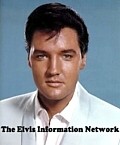
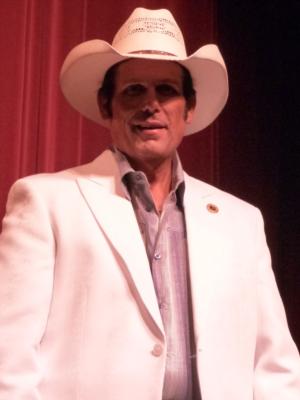
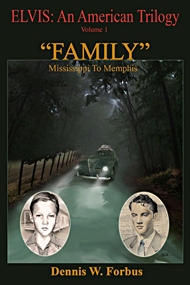
.jpg)
.jpg)
.jpg)
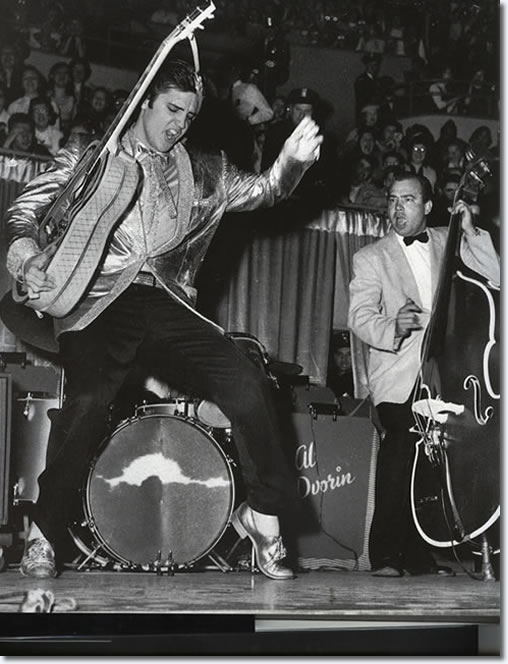
.jpg)
.jpg)
